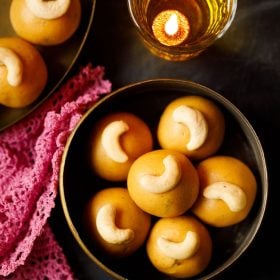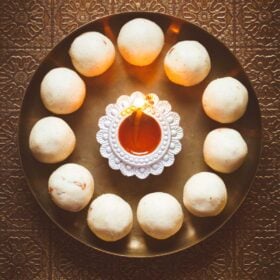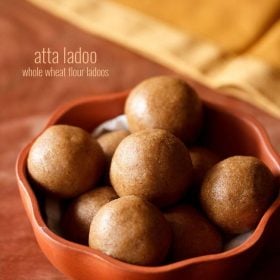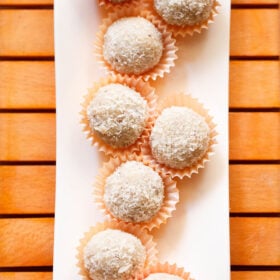
Here’s a recipe from the vast Indian cuisine, which is classic, yet is made with a very unique ingredient – Gond Ke Laddu. The main ingredient in this one of the most popular Ladoo Recipes is gond a.k.a edible gum, along with whole wheat flour (atta), clarified butter (ghee), sugar and nuts. You may add some cardamom powder for an extra flavor in the laddus but without it also, these taste just delightful. What’s more is that it has many health benefits and is warming for the body, especially during the North Indian winter season.
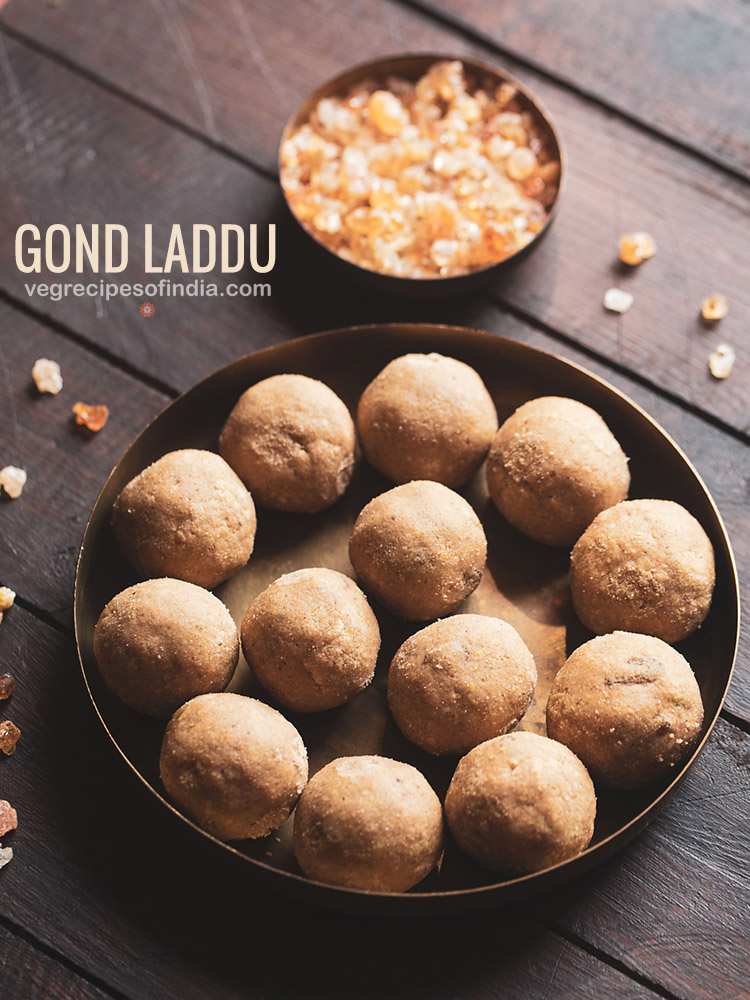

What is Gond
Like I mentioned in the beginning, ‘gond’ is the Hindi word for ‘gum.’ These are natural gums derived from the sap of trees, some of which are edible and some not.
Indian cuisine traditionally uses some of these edible gums in making the Gond Ke Laddu, a common sweet snack.
In addition to this Gond Ke Laddu recipe, there are various other dishes that include gond as an important ingredient.
But before I mention about those, here is a bit more on the 2 most used types of edible gums in Indian cuisine (particularly in North India):
1. Tragacanth gum: This one (photo below) is also called as ‘katira gond’ in Hindi language and ‘badam pisin’ in Tamil language.
It has cooling properties and thus, is used as a cooling ingredient in summers. Thus also added to typical refreshing summer beverages like gond sharbat, Jigarthanda, Falooda, etc.
It swells and becomes jelly like when soaked in water. Due to this property, it is used as a thickener in many food items.
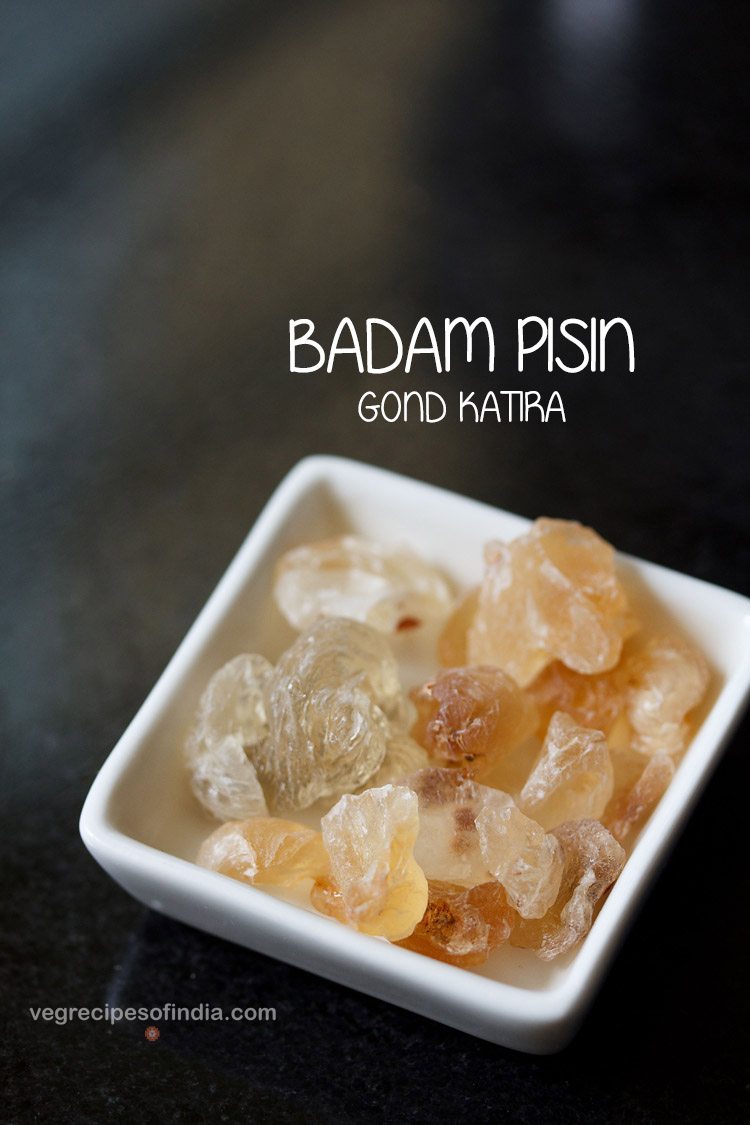

2. Acacia gum or gum Arabic: This is the dried sap of the acacia tree, also referred to as the babul tree (kikar) in Hindi. It is known as ‘Dink’ in Marathi or ‘Gond’ in Hindi.
To make Gond Ke Laddu, acacia gum is used. Acacia gum is heaty and thus, consumed during winters as it helps to keep the body warm.
Gond Ke Laddu and Gond Panjiri are quintessential winter sweets in many parts of North India. Gond ladoo is also great for nursing mothers.
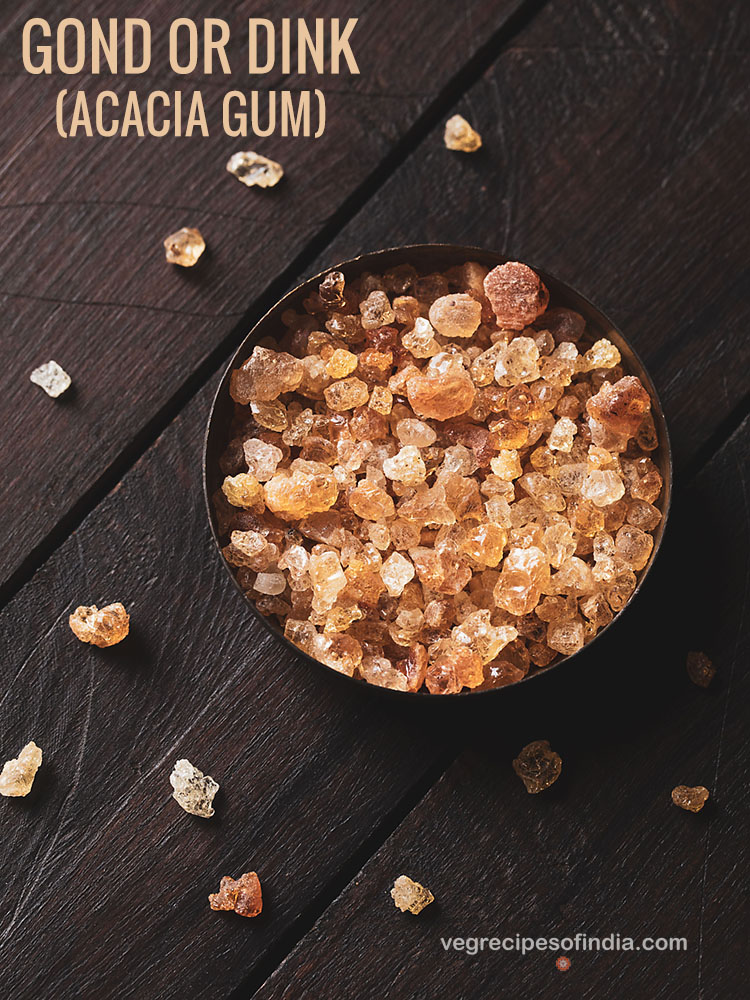

About Gond Ke Laddu
Making Gond Ke Laddu is a winter ritual in my home, every year. We usually make 1 to 2 kilograms of these ladoos during winters.
I have been preparing these laddus since long now. Hence, it was only right to share this recipe with you all here.
Also, because it is one of the classic Indian recipes, which is also beneficial for the health.
Gond Ke Laddu is also called as Dink Ladoo in Maharashtrian cuisine. However, this particular recipe is a Punjabi one that I originally learned from my mother-in-law. Since the time I learnt it from her, I have been making it at home.
In this recipe, I have ground the unrefined sugar to get a fine powder. You can even use store-bought powdered sugar while making Gond Ke Laddu.
These laddus are nutrient-dense, heavy and filling, as apart from gond, whole wheat flour, ghee and nuts are also added in the recipe.
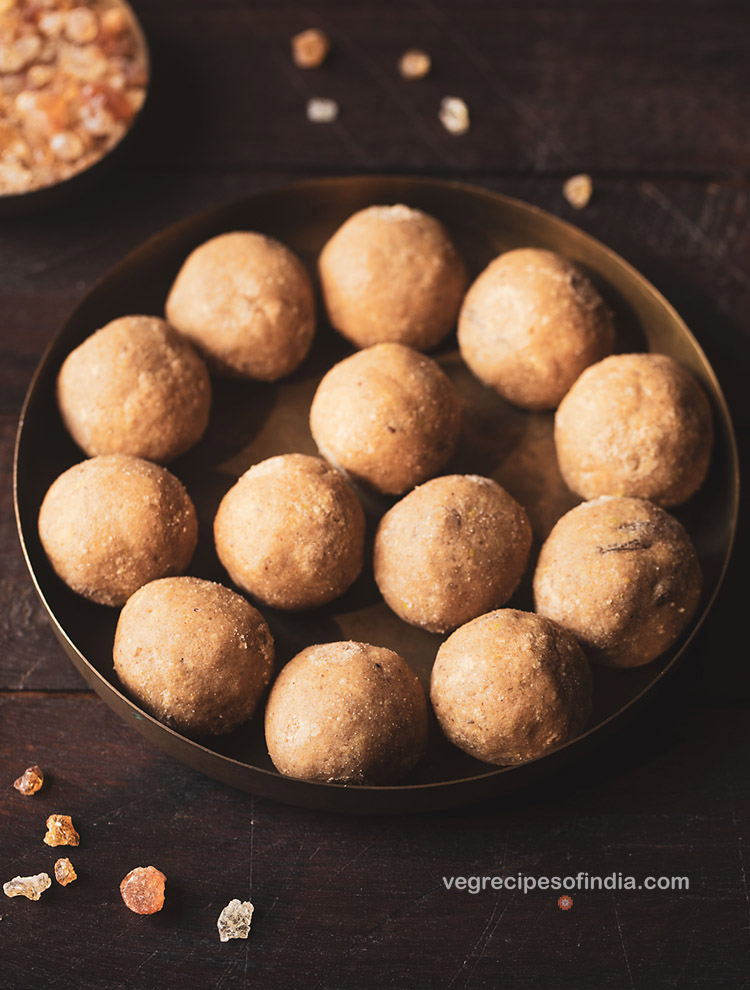

Step-by-Step Guide
How to make Gond Ke Laddu
Make Powdered Sugar
1. Take 1 heaped cup raw sugar (200 grams) in a grinder jar.
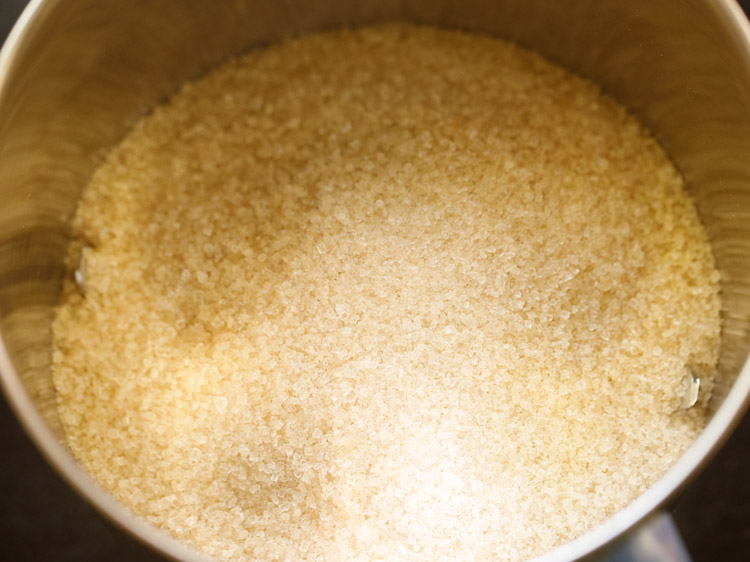

2. Grind to a fine powder. Remove on a plate and set aside.
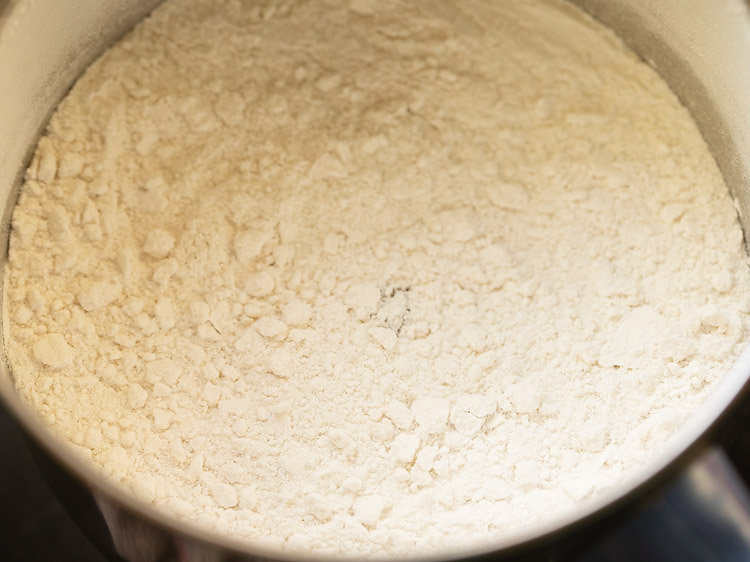

Fry Nuts
3. Heat ½ cup + 4 tablespoons desi ghee in a heavy kadai. Do not use a non-stick kadai. A heavy iron or aluminum kadai works best for frying gond.
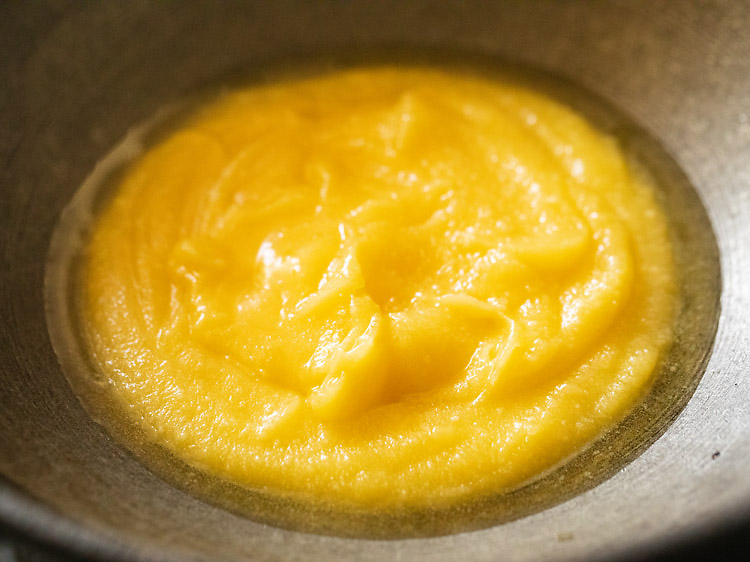

4. Let the ghee melt. Keep heat to medium-low.
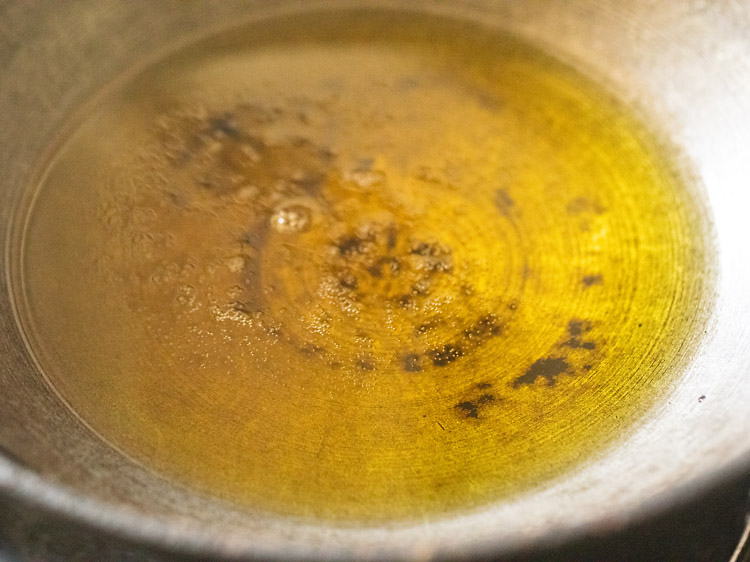

5. Add 2 tablespoons almonds.
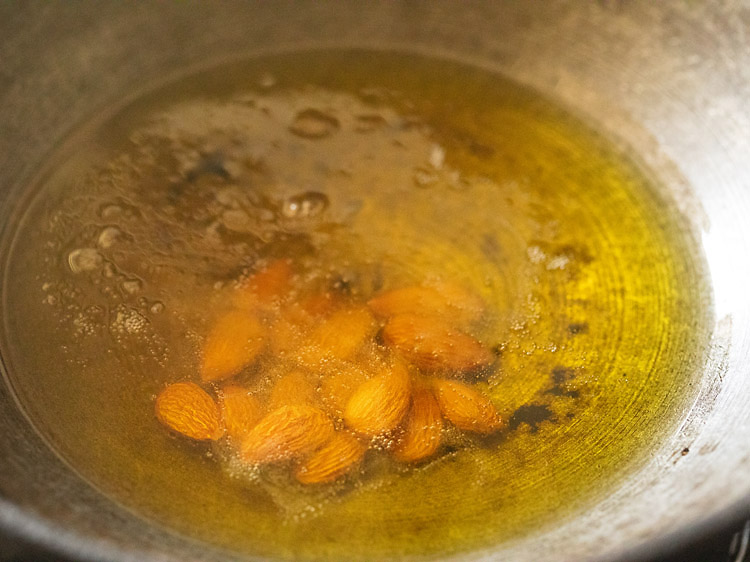

6. Stirring often, fry almonds.
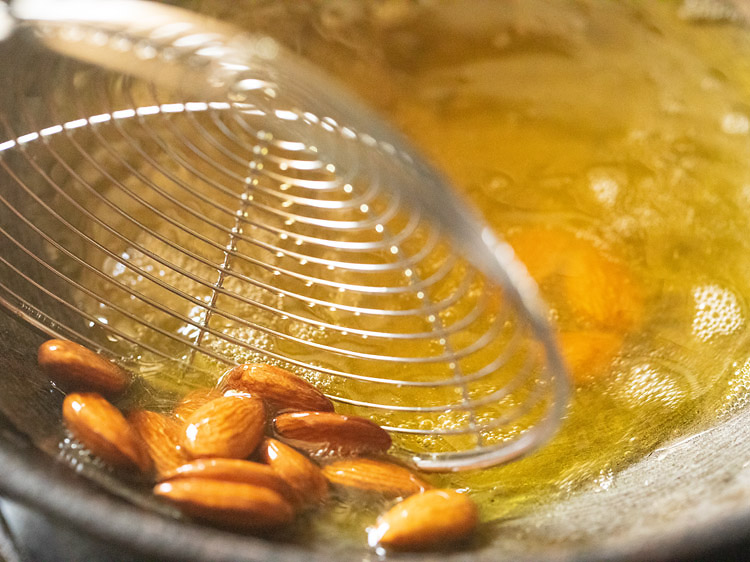

7. Fry almonds till they change color. Remove with a slotted spoon and keep aside.
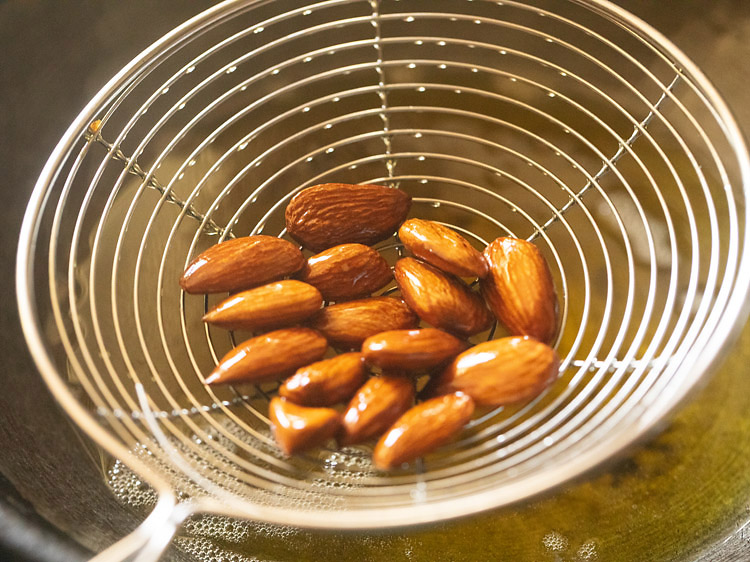

8. Now, add 2 tablespoons cashews.
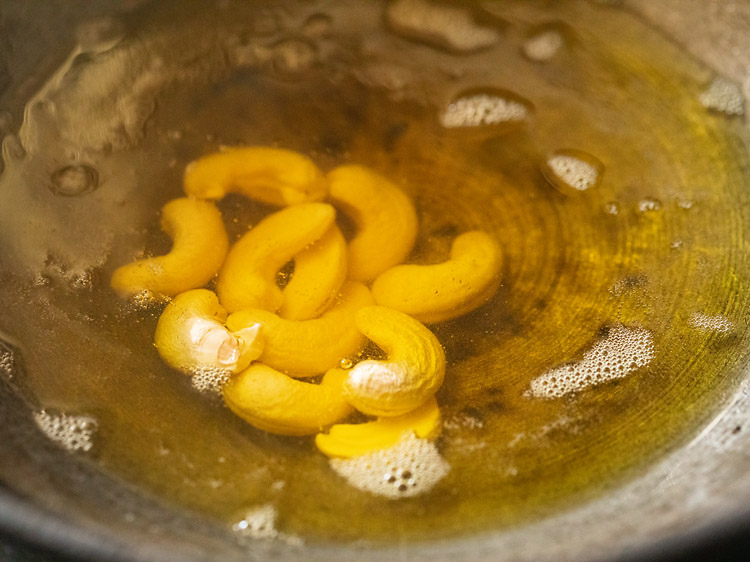

9. Stirring often, fry cashews.
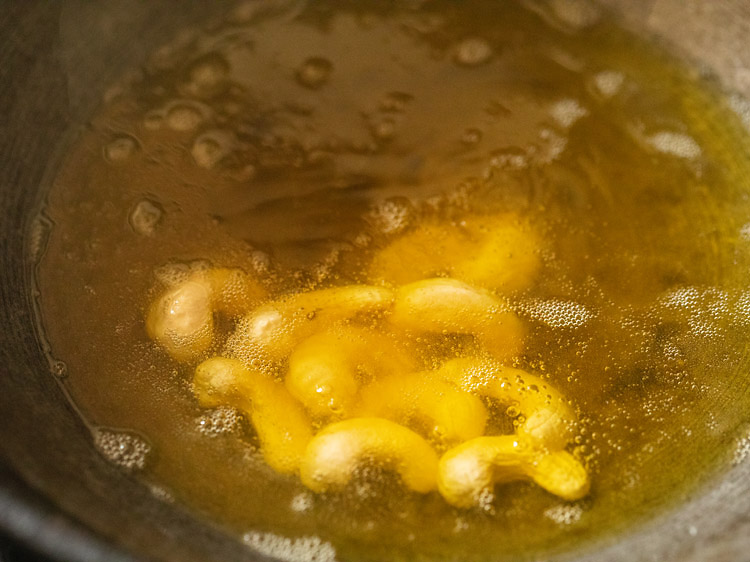

10. Fry cashews till they become light golden or golden. Remove with a slotted spoon and keep aside.
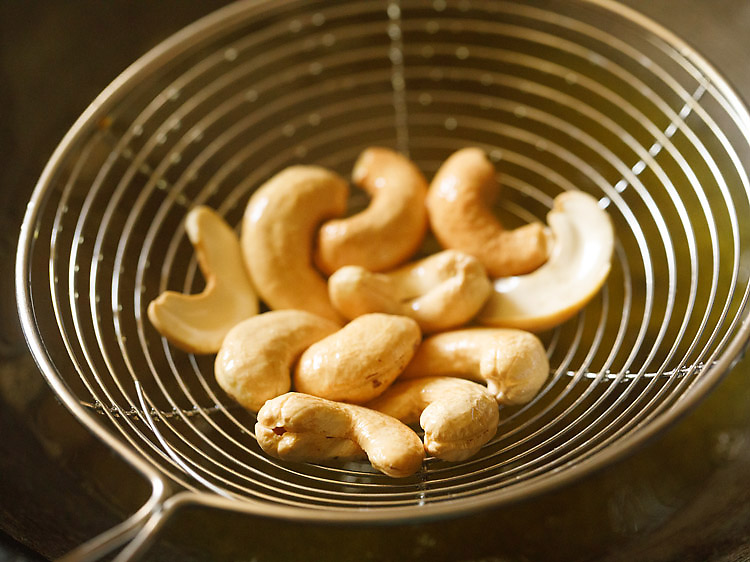

11. Add 2 tablespoons pistachios. Fry for some seconds till they change color.
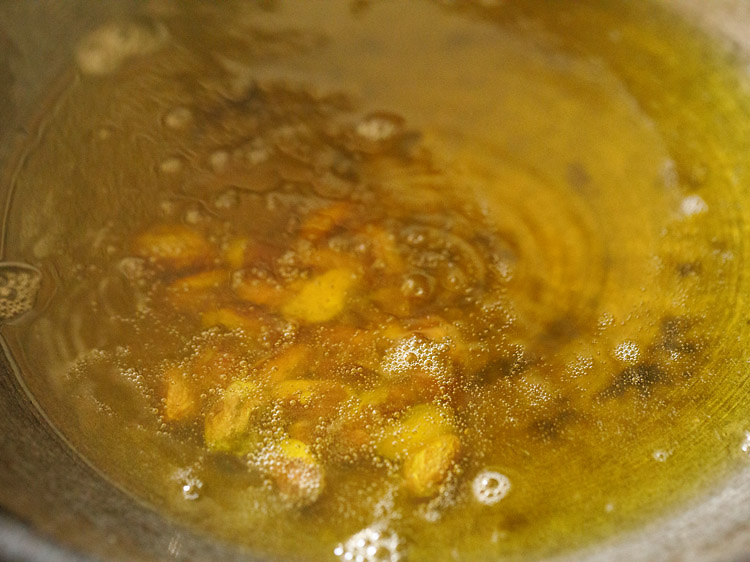

12. Remove and keep aside.
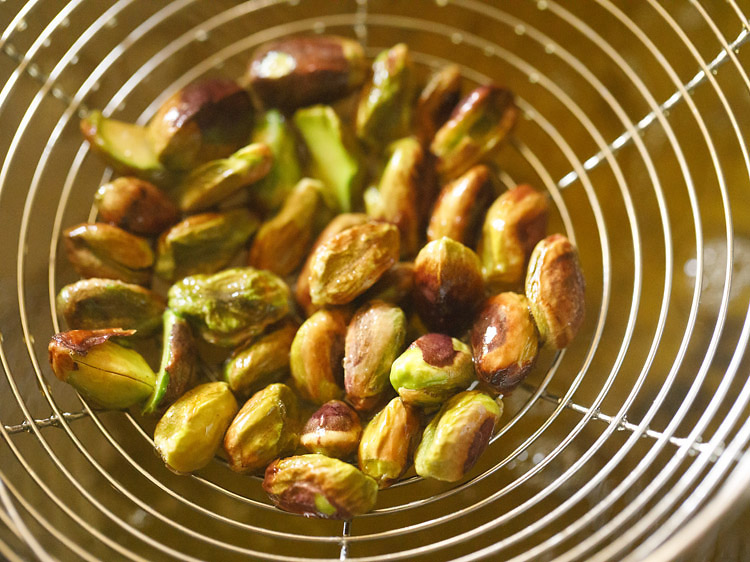

Fry Gond
13. Now in the same ghee, add one piece of gond. If the gond comes up gradually and puffs up, the oil is ready to fry the gond.
If the gond settles down in the oil, then increase the heat and let oil become hot.
In case the gond comes up quickly, then oil is very hot. Reduce the heat so that the oil temperature reduces a bit.
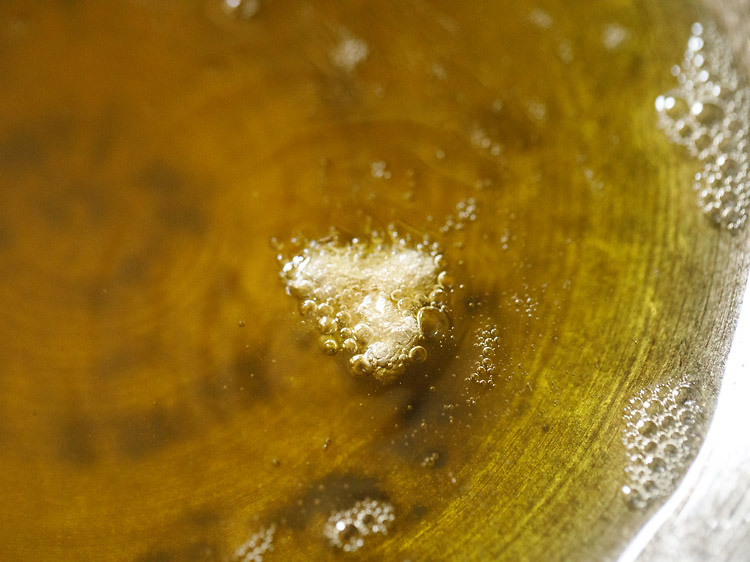

14. Add gond in 2 batches. If you are experienced, then add gond in a single batch. I added all the gond at once and fried them.
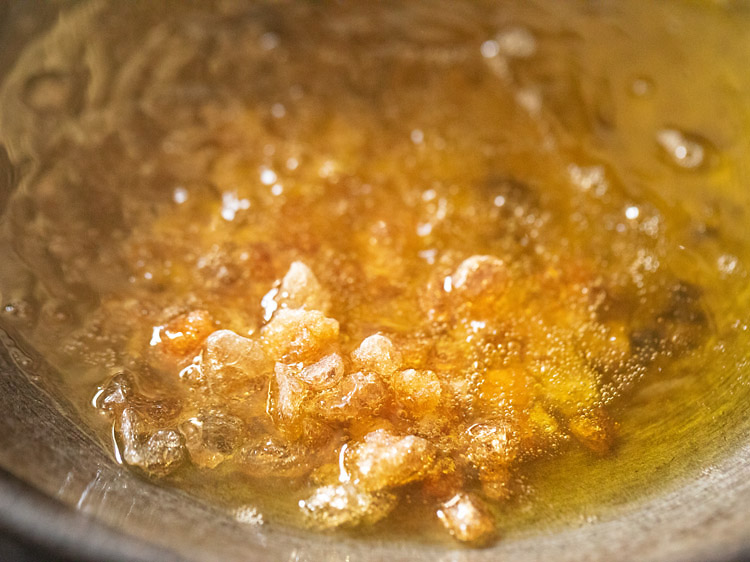

15. Stir continuously and fry gond till all of it puffs up.
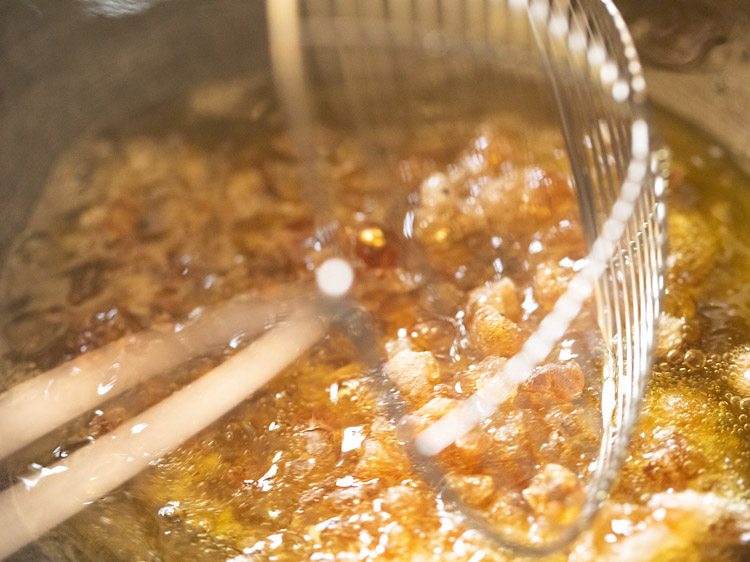

16. The gond pieces have to be fried evenly.
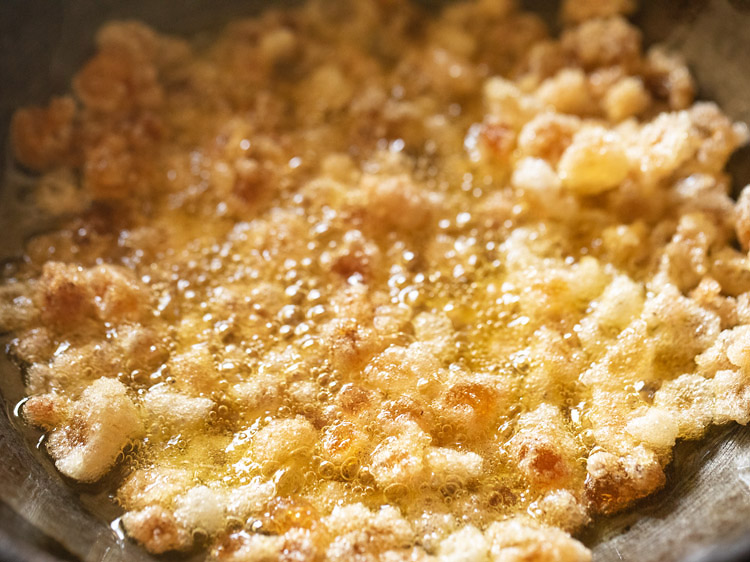

17. Stir continuously.
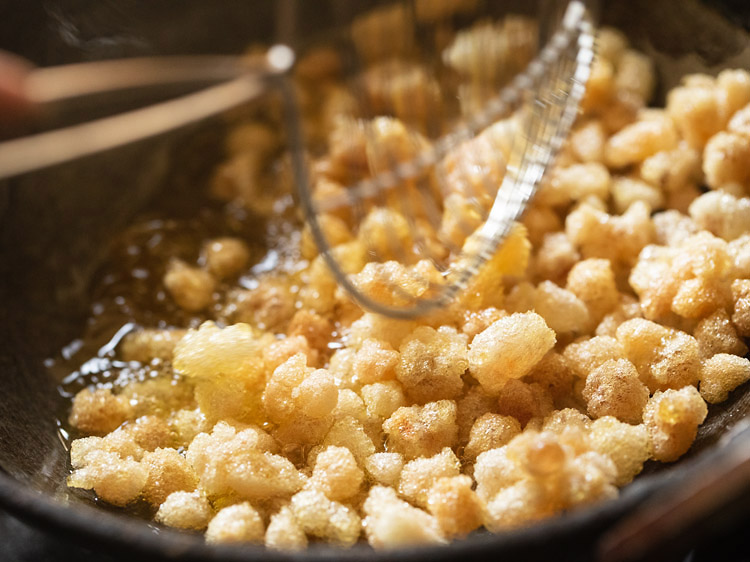

18. Fry well in ghee and do not burn the pieces. They will turn heavy and puff up while frying.
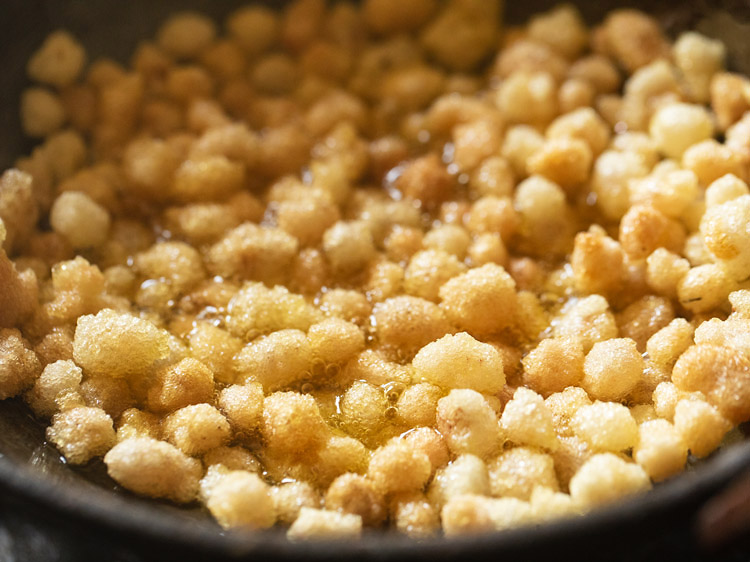

19. Remove the puffed up gond with a slotted spoon.
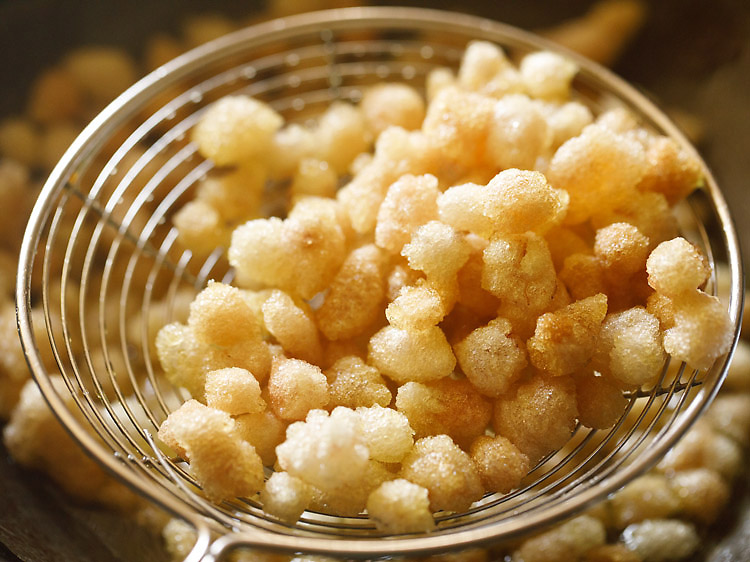

20. Keep aside in a bowl or plate.
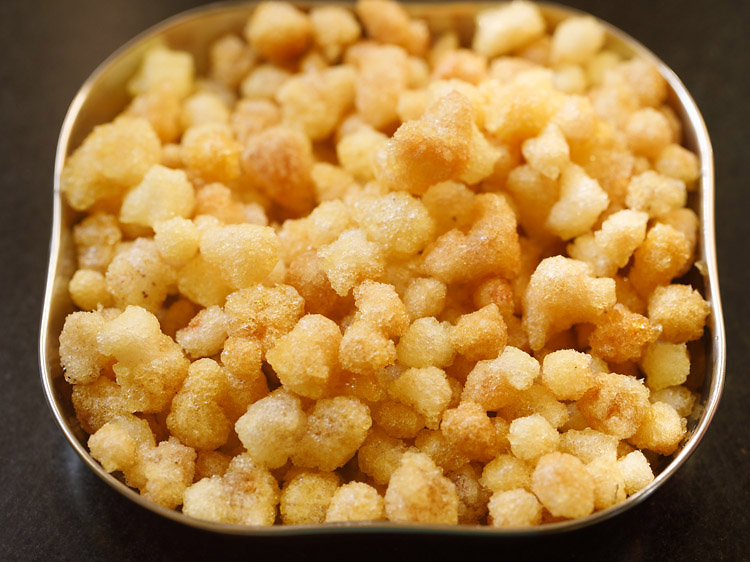

Roast Whole Wheat Flour
21. Reduce the heat to low and add 2 cups whole wheat flour (atta) in the same ghee.
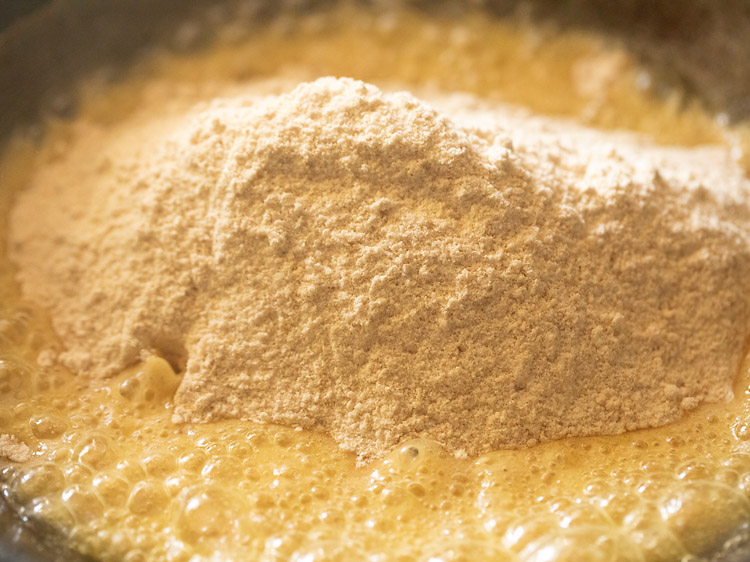

22. Mix flour very well with ghee.
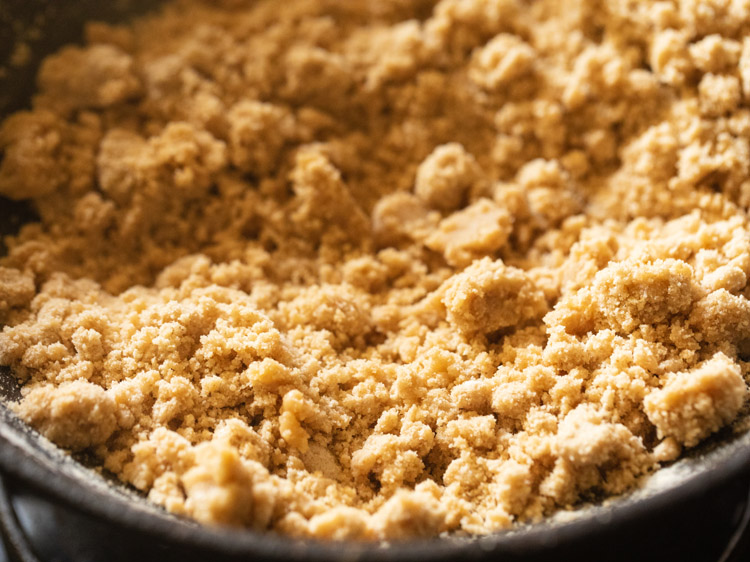

23. Begin to roast flour with the ghee on medium-low to medium heat.
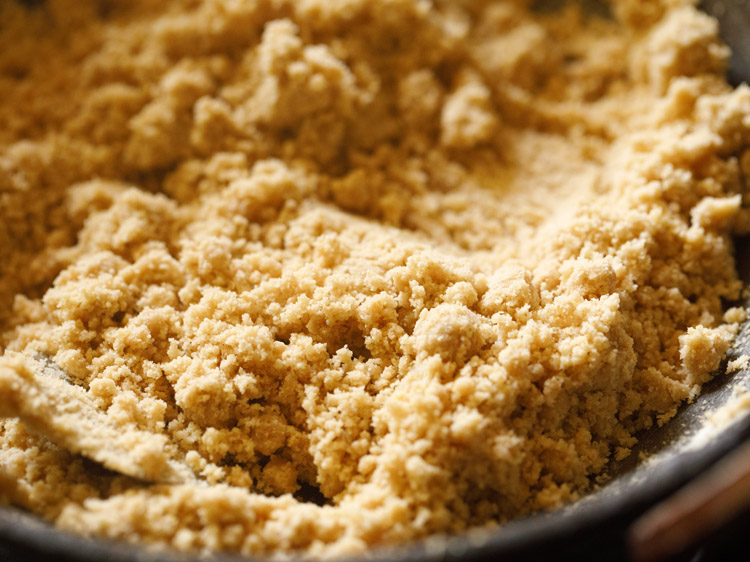

24. While the atta is getting roasted, add fried nuts in a grinder jar.
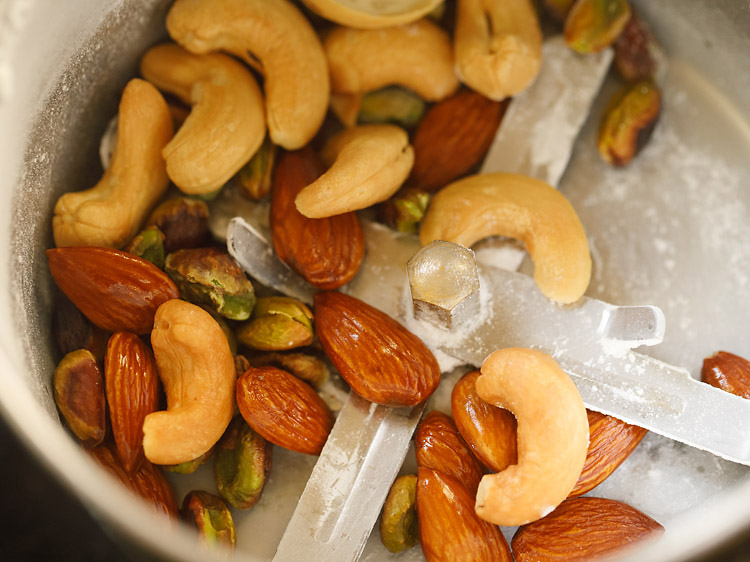

25. Also add the fried gond in the grinder jar or spice-grinder.
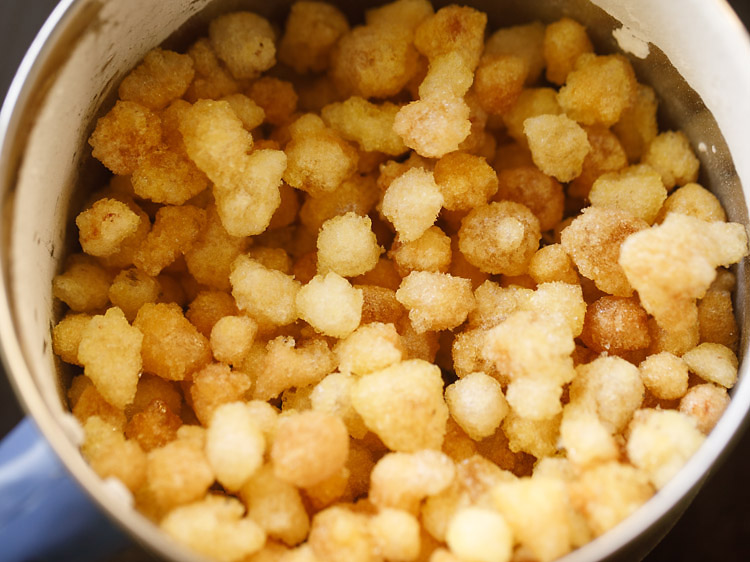

26. Pulse and grind to a semi-fine or coarse powder. You can keep the nuts whole, if you want. You can also use a rolling pin and crush gond. Keep the powdered gond-nuts mixture aside.
Note that the atta is getting roasted, while you grind the nuts and gond. If you are not able to multitask, then switch off the heat after frying gond.
Crush nuts and gond in the grinder. Then, switch on the heat again and let ghee become slightly hot. Add atta and roast.
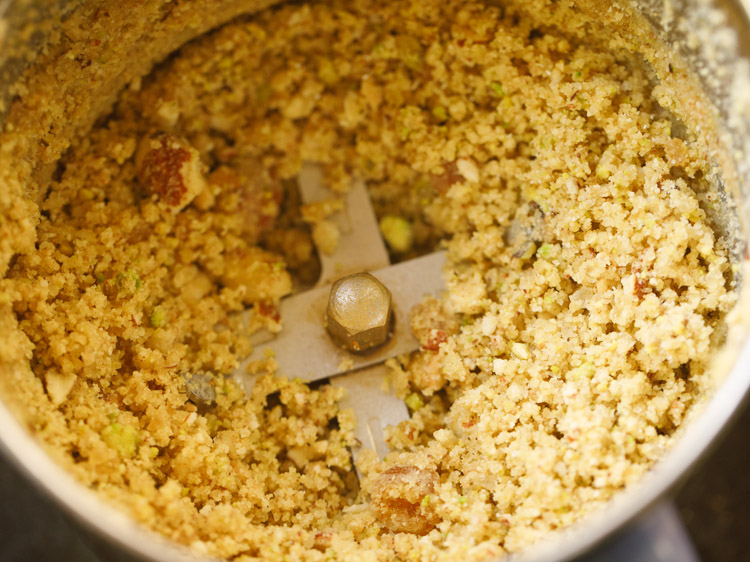

27. Continue to stir and roast the atta.
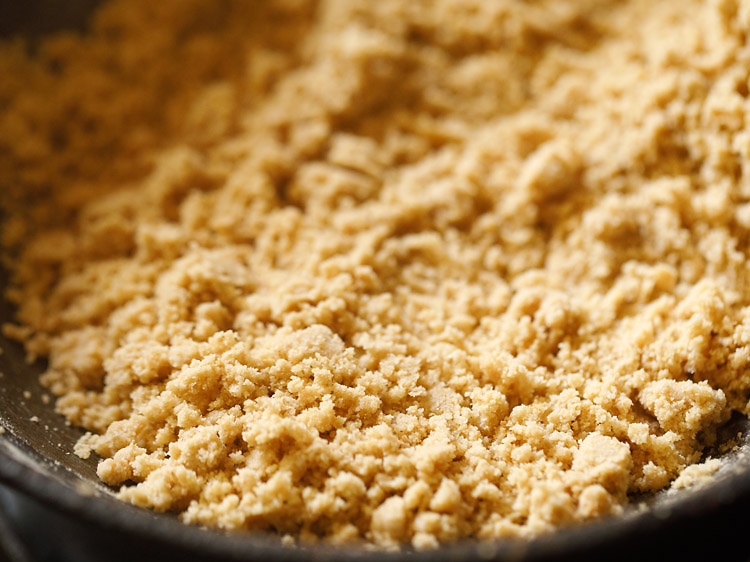

28. Roast atta till the color changes and you get a nutty aroma. Stir continuously, when you see the atta changing its color.
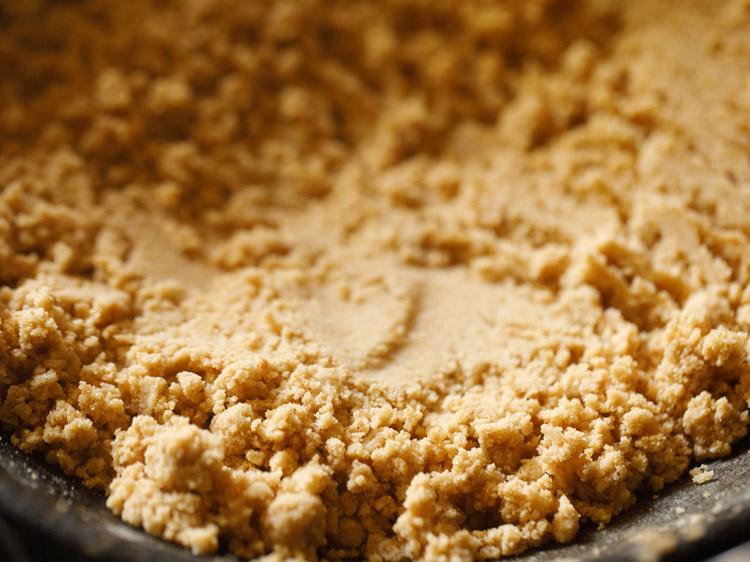

29. Stir and roast till the atta becomes golden or brown. Overall it took me a total of 17 minutes for the atta to get roasted to perfection (I had used a heavy iron kadai).
Note that the timing will vary with the material, size and thickness of the kadai or pan. If you use steel kadai, then it will take less time.
Also, check the taste of the roasted whole wheat flour and it should feel cooked. You should not feel any rawness in the taste.
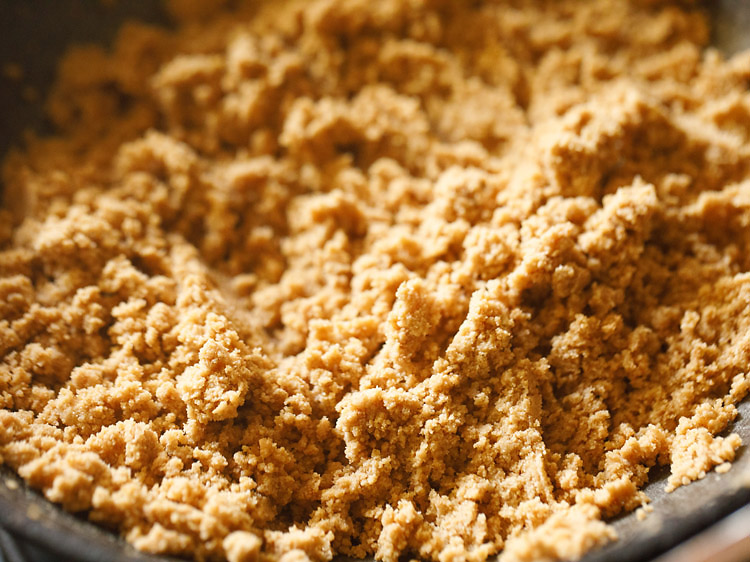

Make Gond Ke Laddu
30. Switch off the heat. Remove the kadai from the stovetop, add 2 tablespoons raisins and 1 teaspoon cardamom powder. You can even skip cardamom powder.
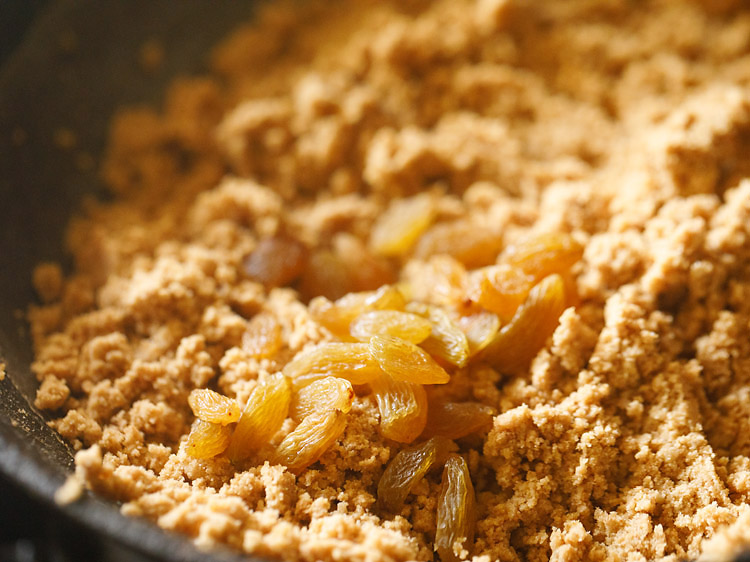

31. Next, add the powdered sugar.
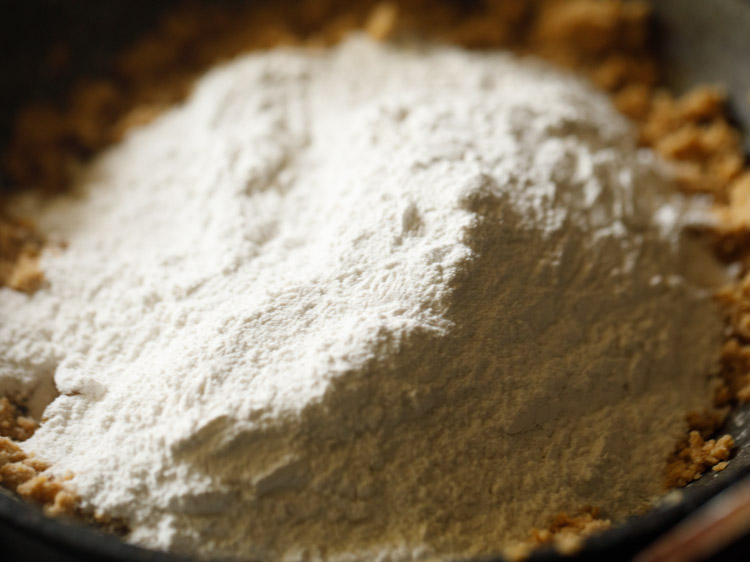

32. Add the prepared gond-nut mixture.
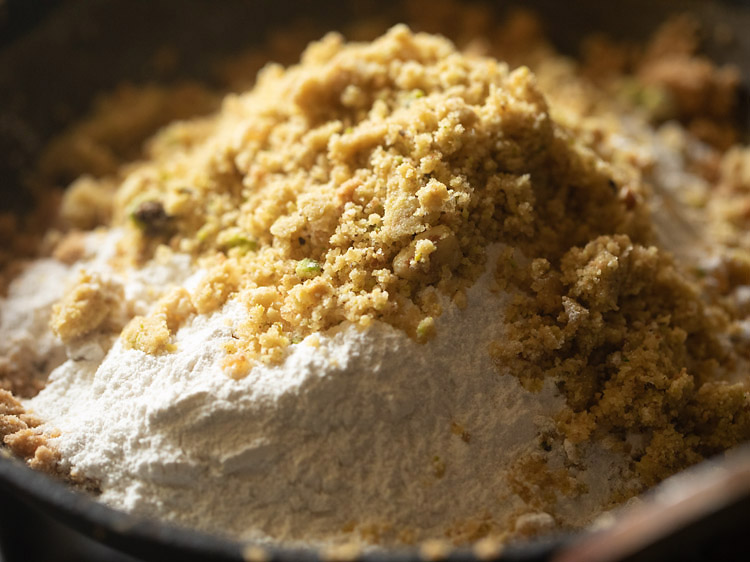

33. Begin to mix with a spoon. While mixing, break the sugar lumps with a spatula or spoon, if any, in the mixture.
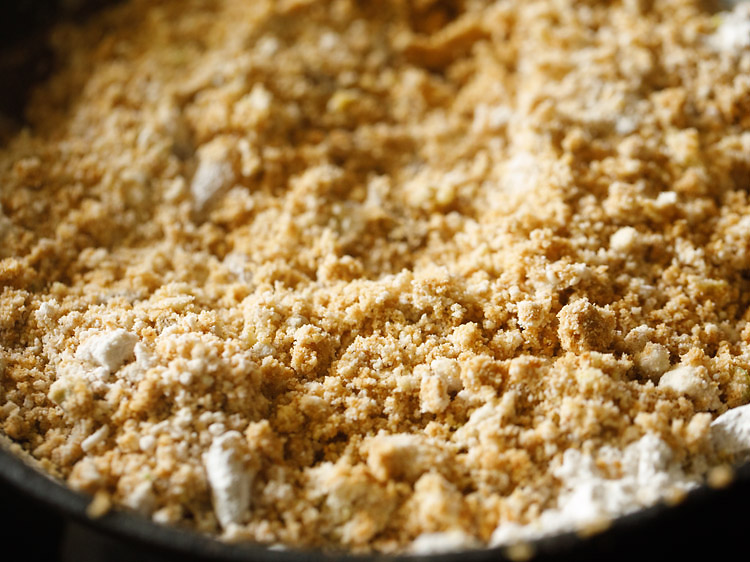

34. Mix very well.
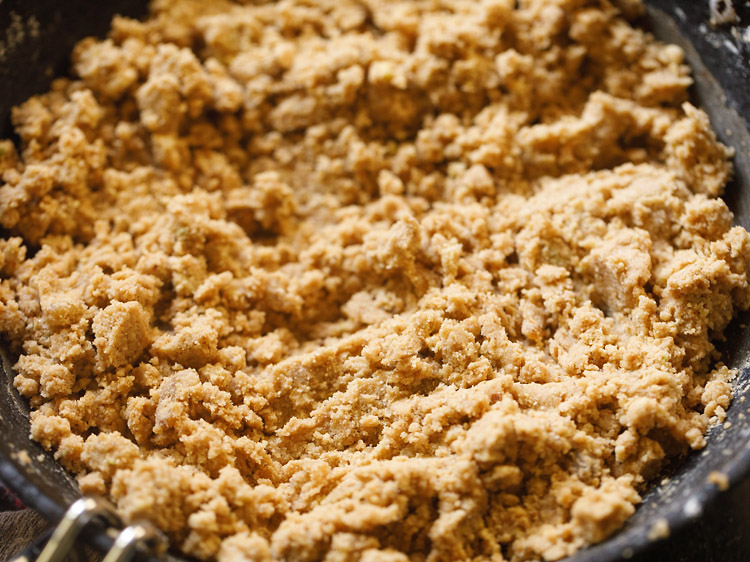

35. When the ladoo mixture is still hot and the heat is tolerable to you, take a heaped size portion of it in a spoon or in your palms. Shape in a round ladoo.
In case the heat is not tolerable, then wait for some minutes. Avoid burning your hands.
If the mixture does not hold shape, then add 1 to 2 tablespoons ghee. Note that the ghee should be in a semi-solid state at room temperature.
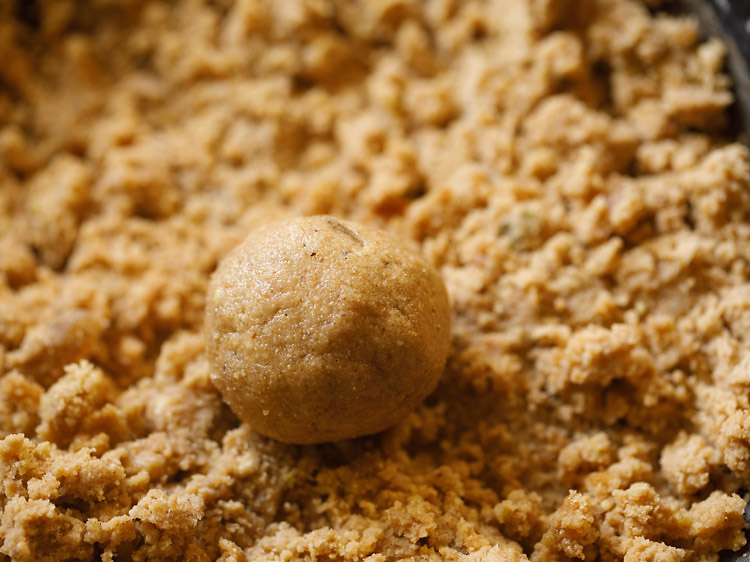

36. Make medium-sized Gond Ke Laddu from the prepared mixture.
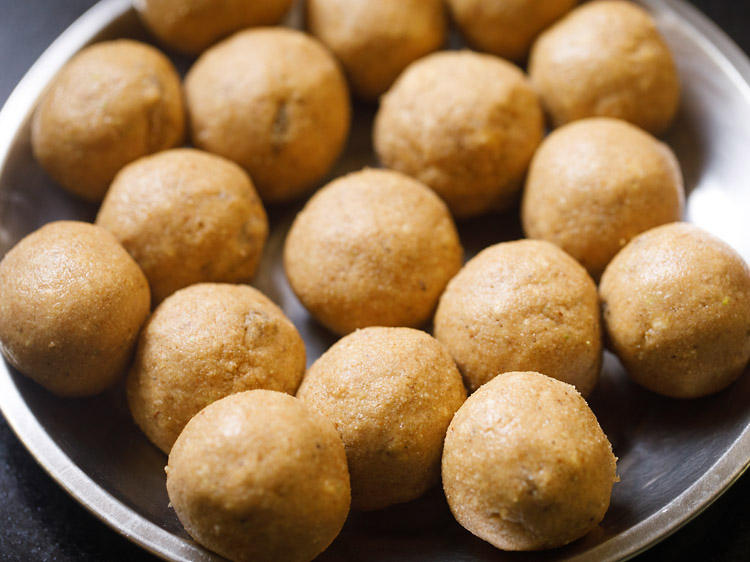

38. Serve Gond Ke Laddu as a winter sweet snack plain or with some hot milk.
When cooled to room temperature, store in an air-tight steel container at room temperature for a couple of months.
The recipe yields 17 to 18 laddus and can be easily doubled or tripled. You can even half the recipe.
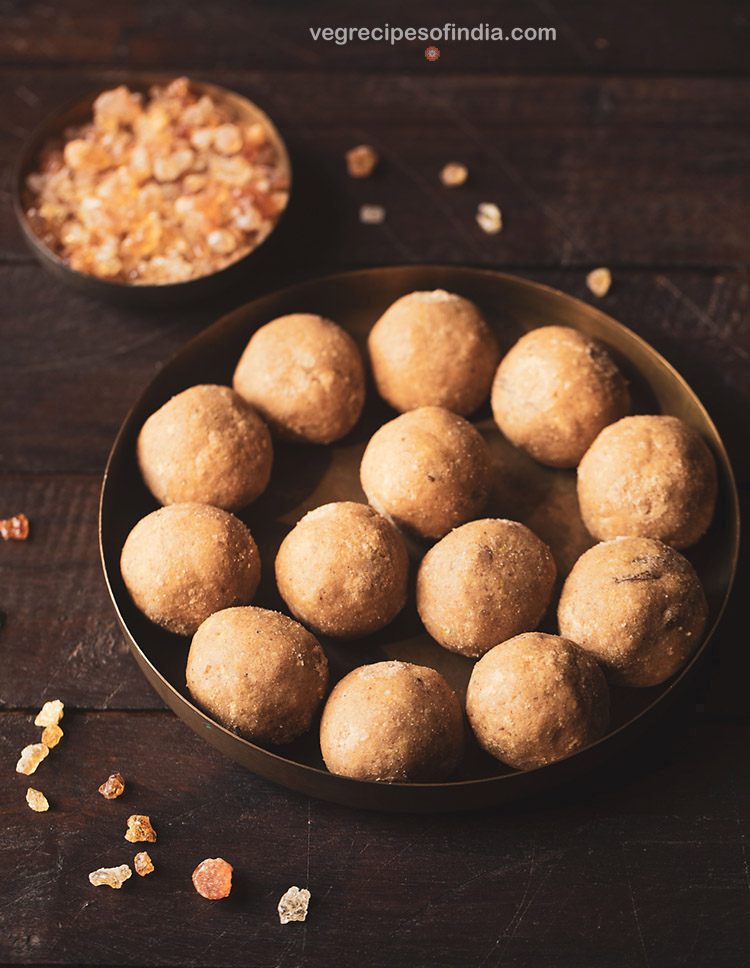

Benefits of Gond
Here are some of the reasons why you must consider trying this recipe of Gond Ke Laddu all the more:
- Gond is a good source of calcium; thus, helps in keeping the bones and teeth strong
- Being heaty, it helps to keep the body warm during cold winters
- It is also an excellent source of energy; thus, is apt for winter consumption and good for kids too
- Gond is given to nursing mothers as it helps in strengthening the backbone and aids in milk production. It also helps in giving energy and strength to mothers after pregnancy
- It also helps the uterus to get back to its size, post child birth.
While the above is why should absolutely consider including the acacia gum in your diet, one important thing to remember is that you should avoid consuming it during pregnancy, as it is heaty in nature.
Expert Tips
- Gond: Use good quality gond and buy from a known source. Usually, gond is available in Ayurvedic shops or can be sourced online as well.
- Nuts & Dry fruits: Nuts and dry fruits are also added in this laddu recipe. I usually the easily available ones like almonds, cashews, pistachios and raisins. You can add other types of nuts and seeds like poppy seeds, makhana, fenugreek seeds (methi) or even dry coconut and dates. You can increase the quantity of nuts and dry fruits, if you want.
- Fats: For best results, make these gond ladoos with homemade ghee or desi ghee. In this recipe, ghee not only adds flavor but also helps as a binding factor in the ladoo. Moreover, ghee also helps in digesting the laddus. So, stick to the quantity mentioned in the recipe and not reduce it.
- Sweetener: I prefer adding khand or khandsari (desi raw, unrefined sugar) in this recipe. You can even add refined sugar or jaggery.
- Frying gond: Make sure to deep-fry gond well, as even slightly raw gond can cause stomach problems. If you are pan-frying or shallow-frying, then it may not puff up well.
- Roasting flour: Roast the whole wheat flour also, very well. Slight rawness in the flour will spoil the taste and texture of the ladoo as well as not suit the stomach.
- Shaping laddus: Gond ladoos are shaped when the mixture is still hot. If you are unable to shape, then add 1 to 2 tablespoons more ghee in a semi-solid state at room temperature. If ladoos are not able to hold their shape or getting flattened, it means there is more ghee. In this case, let the mixture cool completely and then shape.
- Scaling: This Gond Ke Laddu recipe can be halved, doubled or tripled easily.
More Ladoo Recipes To Try!
Ladoo Recipes
Ladoo Recipes
Ladoo Recipes
Please be sure to rate the recipe in the recipe card or leave a comment below if you have made it. For more vegetarian inspirations, Sign Up for my emails or follow me on Instagram, Youtube, Facebook, Pinterest or Twitter.
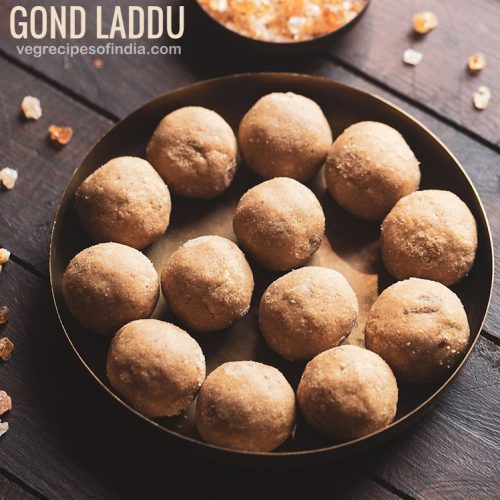

Gond Ke Laddu | Nutritious Gond Laddu
Gond ke laddu is a popular winter sweet from north India. This nutrient dense laddu is made of gond aka edible gum, whole wheat flour, ghee and nuts. Gond laddu are tasty as well as healthy. This recipe can be halved, doubled or tripled.
Prep Time 12 minutes
Cook Time 18 minutes
Total Time 30 minutes
Prevent your screen from going dark while making the recipe
Frying nuts
- Keep all the ingredients ready before you begin. Heat desi ghee in a heavy kadai. Please do not use a non-stick kadai. A heavy iron kadai or aluminium kadai works best for frying gond.
Let the ghee melt. Keep heat to medium-low.
Add almonds. stirring often fry almonds till their color changes and then remove with a slotted spoon. Keep aside.
Now add cashews. stirring often fry cashews till they become light golden or golden. Remove with a slotted spoon and keep aside.
Add pistachios. Fry for some seconds till their colour changes. remove and keep aside.
Frying gond
Now in the same ghee, add one piece of gond.
- If the gond comes up gradually and puffs up, the oil is ready for the gond to be fried. If the gond settles down in the oil, then increase the flame and let oil become hot. If the gond comes up quickly, then oil is very hot. Reduce the flame to lower the oil temperature.
Add gond in two batches. If you are an experienced cook, then add gond in a single batch.
Stir non-stop and fry gond till all of them puff up.
The gond pieces have to be fried evenly. So stir non-stop. Fry them well in ghee and do not burn them.
Remove the puffed up gond in a slotted spoon. Keep the fried gond aside and let it cool.
Roasting wheat flour
Reduce the heat to a low and then add 2 cups whole wheat flour in the same ghee.
Mix flour very well with ghee. Begin to roast flour with the ghee.
Meanwhile when atta is getting roasted, add fried nuts in a grinder jar or spice-grinder. Also add the fried gond in a dry grinder jar.
Pulse and grind to a semi fine or coarse powder. You can keep the nuts whole if you prefer instead of powdering them.
- Do note that atta is getting roasted when you grind the fried gond. If you are not able to multitask then switch off heat after frying gond. Crush gond in grinder. Then switch on heat again and let ghee become slightly hot. Add atta and roast. You can also use a belan (rolling pin) and crush gond. Keep the powdered gond and nuts aside.
Continue to keep on stirring and roasting the atta.
Roast atta till its color changes and you get a nutty aroma.
Then stir nonstop when you see the flour changing its color.
- Stir and roast till the atta becomes golden or brown. Overall it took me a total of 17 minutes for the atta to get roasted to perfection.Note that the timing will vary with the material, size and thickness of the kadai or pan. If you use steel kadai, then it will take less time.
Making gond ke laddu
Switch off the heat. Keep the kadai down and raisins and cardamom powder.
Next add the powdered sugar. add the crushed gond and nuts mixture.
Begin to mix with a spoon. While mixing, break the sugar lumps if any in the ladoo mixture with a spatula or spoon. Mix very well.
When the laddu mixture is still hot and the heat is tolerable to you, take a heaped size portion of it in a spoon or in your palms. Shape in a round ladoo.
- In case the heat is not tolerable, then do wait for some minutes. Avoid burning your hands. If the mixture does not hold shape, then add 1 to 2 tablespoons ghee. Note that the ghee should be in a semi-solid state at room temperature.
Make medium sized ladoo from this whole mixture. Store them in an airtight steel container (steel dabba).
They stay good for a couple of months. This recipe can be easily doubled or tripled. From this gond laddu recipe, you can make 17 to 18 laddu.
Serve Gond ke Laddu just by itself or with some hot or warm milk.
- This recipe can be halved or doubled or tripled.
- If you are unable to make laddu and the mixture crumbles and looks dry, then add 1 to 2 tablespoons ghee at room temperature. Mix and form laddu.
- If the ladoo cannot hold shape and flattens then it means there is more ghee. Let the mixture cool completely and then shape into laddu.
- Note that the approx nutrition data is for 1 gond ladoo.
Nutrition Facts
Gond Ke Laddu | Nutritious Gond Laddu
Amount Per Serving
Calories 235 Calories from Fat 117
% Daily Value*
Fat 13g20%
Saturated Fat 7g44%
Cholesterol 26mg9%
Sodium 1mg0%
Potassium 100mg3%
Carbohydrates 30g10%
Fiber 2g8%
Sugar 13g14%
Protein 3g6%
Vitamin A 5IU0%
Vitamin B1 (Thiamine) 1mg67%
Vitamin B2 (Riboflavin) 1mg59%
Vitamin B3 (Niacin) 1mg5%
Vitamin B6 1mg50%
Vitamin C 1mg1%
Vitamin E 1mg7%
Vitamin K 1µg1%
Calcium 11mg1%
Vitamin B9 (Folate) 8µg2%
Iron 1mg6%
Magnesium 30mg8%
Phosphorus 75mg8%
Zinc 1mg7%
* Percent Daily Values are based on a 2000 calorie diet.
This Gond ke Laddu recipe from the blog archives, first published in January 2019 has been republished and updated on December 2022.

Source link
